Ryan Hass, newly appointed director of the John L. Thornton China Center at the Brookings Institution, talks with host David Dollar about the themes and ideas the China Center will be focusing on in the next few years. Hass also reviews the state of U.S.-China relations under the Biden administration, how domestic politics—including Taiwan’s—matter in the U.S.-China competition, and his vision of a best case scenario for U.S.-China relations in the coming decade.
- Listen to Dollar & Sense on Apple, Spotify, Google, or wherever you like to get podcasts.
- Learn about other Brookings podcasts from the Brookings Podcast Network.
- Sign up for the podcasts newsletter for occasional updates on featured episodes and new shows.
- Send feedback email to [email protected].
TRANSCRIPT
[music]
DOLLAR: Hi, I’m David Dollar, host of the Brookings trade podcast Dollar and Sense. Today, my guest is Ryan Hass, who recently has been appointed as the director of the John L. Thornton China Center at the Brookings Institution. So first, congratulations, Ryan.
HASS: Thank you, David.
DOLLAR: We’re going to be talking about the China Center and also about U.S.-China relations more broadly. Let’s start with the John L. Thornton China Center. So, Ryan, what do you see as the key issues that the center should be focusing on in the next few years?
HASS: Well, David, I have a few sort of thematic thoughts and a few specific ideas. The thematic thought is that in recent years, it’s become clear to me at least that studying China is no longer a job solely for China experts. It’s a team sport now. And so one of the things that I hope that we’ll be able to do is to harness Brookings’s unique strength: it’s ability to look at an issue from pretty much every angle on the human condition, to draw from experts on climate and clean energy, public health, trade, economics, security issues, to try to form a more integrated picture of what China is doing and how it fits into what’s happening in the world, how it relates to American interests. So that’s the first thematic thought.
The second is that I hope that we can continue to rigorously examine what’s going on in China without prejudging the outcomes. One of Brookings’s strengths is that it does not have an institutional position on any of these issues. Each scholar is able to reach his or her own conclusions based upon the available data. And when we’re doing our jobs well, it shouldn’t be possible for readers to be able to assume what the conclusion of our findings and our research and our writing is going to be before they’ve read the pieces that we’re producing. So that’s the second big thought is, you know, I hope that we can foster a lively debate that allows a bunch of different viewpoints to flourish within Brookings on questions related to China.
But specific to your question, I think that there are a few areas where we might be able to contribute meaningfully. The first is on helping to identify specific opportunities where the United States might be able to advance its interests. Sometimes this may be with China, sometimes it may be about China. But the basic point is that I think that our research should be tied to the question what will best enable the United States to protect its people, to promote the country’s prosperity, and to improve the country’s health? And I’m happy to leave performative outrage to others and let others sort of follow the latest trend and react on it. I have no interest in being a trend hugger myself.
But the second big sort of area where we might be able to plug in to the discourse is on the question of what is strategic success with China? What does that look like? What is the vision of success? How do we know if our approach is working? What are markers of progress? It’s a really hard question. I don’t have a soundbite answer to this question myself, but I hope in the coming years we can continue to continue to contribute to fleshing that out.
DOLLAR: I love the idea of harnessing all of Brookings. That China is just such an important part of so many issues in the United States, and Brookings has got these five basic departments or programs. And I’ve had a lot of good experiences working with our colleagues, for example, in Economic Studies—
HASS: —right—
DOLLAR: —on the Chinese economy, but also our colleagues in Governance Studies, because China is such an important part of the political debate in the United States. Our colleagues in Global, that China has a big imprint around the world. I think that’s a really nice way to think that you’ve got the potential to harness all of Brookings not working all the time on China, but a lot of different parts of Brookings have relevance for China.
HASS: That’s great. Well, I hope we’re able to move down that path.
DOLLAR: So let’s talk a little bit about U.S.-China relations. Recently, there’s been a perceived thaw in relations. Relations were frosty under President Trump and certainly continuing in the beginning of the Biden administration. But recently, we’ve had visits to Beijing, high profile visits of Secretary Blinken and then Secretary Yellen and some other officials. So is there a thaw going on and how far is this likely to go?
HASS: Well, I haven’t been thinking of recent developments in terms of a thaw. More so in terms of both sides acting in their own self-interest. I think that President Xi confronts a thicket of challenges at the moment, and it would be in his interest to try to slow the pace of American pressure and Western pressure on China. And I think that for President Biden, it is in his interest to demonstrate competence in being able to manage a very competitive and complex relationship, particularly as we head into 2024 presidential election season. And so both leaders, for their own reasons, have an incentive to try to lower the temperature and cool down tensions a bit.
And if this helps to restore a bit of functionality in the relationship, then I think the world will be a better place for it. But I wouldn’t want to oversell the idea too much. It’s worth recalling that both leaders met last November in Bali on the margins of the G20 summit, and at that time agreed that it would be important to stabilize the relationship. And of course, in the months that followed, the relationship continued to travel a downward path.
This year, both leaders are expected to meet again in November on the margins of the APEC leaders’ summit. And we’ll have to see how that conversation goes and where it points the relationship from there.
DOLLAR: Yeah, it’s a good point that it’s easy to say we should stabilize relations, but then each country is pursuing its own interests and some of the things it does disturbs the other country. And then that upsets any tendency toward towards stabilization.
HASS: Yeah, I think that both leaders are allergic to the perception of being soft or accommodationist to the other. Both are going to be pretty vigorous in defending their view of their interests. But within that space, there should be a capacity to find a little bit more of a stable equilibrium, at least for the short term.
DOLLAR: So let’s talk about what’s probably the thorniest issue between the U.S. and China, which is Taiwan. This is something that you’ve studied and written about. How do you see the administration, our U.S. administration, handling the Taiwan issue?
HASS: Well, I think that the United States, just as a broad principle, is at its best on Taiwan when it’s resolute, when it’s clear, when it’s confident, and its disciplined. I don’t think it would be possible to associate those attributes with the first couple of years of the Biden administration’s approach to Taiwan very credibly. We had military leaders arguing over what the anticipated date of the Chinese invasion of Taiwan would be. We had erratic statements from throughout the U.S. government. And Congress also played its own role in the noise that was coming out of Washington and the anxiety that was coming out of Washington on Taiwan.
But to their credit, I think in the past period of months, the Biden administration has tightened the hatches a bit in its thinking, in its approach on Taiwan. They are projecting more calm confidence. They are talking now about how conflict is neither imminent nor inevitable. And they have reasserted a certain degree of discipline in the way that we interact with and talk about Taiwan. And I think this matters greatly because I do think I do believe that Taiwan is the most sensitive geostrategic issue in the world today.
DOLLAR: Yeah, it does seem sometimes Taiwan is just a hot potato between the U.S. and China. But of course, it’s a vibrant democracy that has agency. It has an important presidential election coming up in January 2024. So talk a little bit about Taiwan politics, the election, and how that’s going to have an impact on both mainland China and the United States.
HASS: Yeah, I think that the election both in Taiwan and the United States will elevate risk somewhat of instability in the Taiwan Strait. But I don’t think that the risk is going to come from Taiwan. I don’t fear that Taiwan is on the cusp of declaring independence and setting off an escalatory spiral. If there’s going to be instability I worry that more so that it will come from China and China concluding that their strategy is simply not working and that they need to take more aggressive measures to try to reclaim control of the narrative and the direction of travel in the Taiwan Strait.
The reason why I feel that way is because my sense is that the Taiwan electorate is pretty pragmatic. They’re not clamoring for independence because they don’t want war. And so I think there’s a low risk on that side. I also think that the risk of China deciding to throw caution to the wind and pursue a cosmic roll of the dice to have a surprise invasion of Taiwan is a very low probability as well, but it’s not zero. So I do think we need to take it seriously.
DOLLAR: Do you think the Russian invasion of Ukraine has an influence on China in terms of how its thinking about Taiwan? And which way does that go? Does that encourage them to be more adventurous or does it encourage them to be more cautious?
HASS: I like to think that it will encourage sobriety, the fact that the Russians are experiencing so much trouble in Ukraine militarily. But the reality is it may be too soon to tell. If Russia ends up prevailing in Ukraine and achieving its strategic objectives through the use of force, then I think that the risk to Taiwan will go up, not down. But a lot will depend upon how the outcome of the conflict is ultimately adjudicated.
DOLLAR: So another contentious issue between the U.S. and China concerns access to high technology. The U.S. has long had various export restrictions on certain technology items. And basically this has gotten ramped up both under President Trump and further under President Biden. Recently, we had the national security adviser, Jake Sullivan, at Brookings, talking about this issue and U.S.-China relations more broadly. And he used the image of a small yard with a high fence. And I think Secretary Yellen, both in her speech and in her meetings in Beijing, was pushing the same idea, that the U.S. is not trying to keep China down economically with these restrictions, it’s trying to target them pretty narrowly to things that really would enhance China’s military capability. That’s the idea of the small yard with a high fence. So we limit a modest number of technologies where we don’t want these to diffuse to China, but we have a high fence, meaning we have some pretty serious restrictions. So are we actually following this policy?
HASS: Well, I, like many of us, was in attendance for Jake Sullivan’s speech at Brookings. And I thought it was a pretty eloquent articulation of the administration’s views and goals. Their goals seem clear. They want to revive manufacturing in the United States. They want to diversify supply chains. And they would like to minimize the leakage of technology being transferred to China that could support their military capabilities to target or attack the United States or its allies. That all makes sense, even if the methods in which they’re pursuing those goals may be suboptimal.
The problem, though, is that what we are saying is not being taken at face value by our Chinese counterparts. I listen to our Chinese counterparts, what I hear them telling me and many of us, is that de-risking is really just a polite term for decoupling. And in fact, it may be more pernicious from the Chinese perspective because it may have more purchase with our allies and partners than the word decoupling or the concept around decoupling otherwise would.
On the idea of a small yard with a high fence, our Chinese friends complain regularly that the yard is growing daily and it’s not that small anymore. I had lunch with a Chinese counterpart recently who noted that there are now around 1,300 sanctions in place against Chinese entities and individuals, and he suggested that 700 of those 1,300 have been implemented in the Biden administration. And the implication of this is that the Biden administration may say soothing words, but their actions tell a different story, that the Biden administration is not showing good faith. And this is an issue of sincerity and a reflection of America’s overall intentions towards China, which are to undermine China’s growth and hobble its rise.
Now, these are his views, not mine. But I think that we need to take them seriously because they are a reflection of the degree of unease and discomfort that Beijing seems to have with the direction of American policy. And I mention this because I’m not sure that that this problem is going to be reconcilable in the near term. In other words, I think that the United States is pretty committed to its path of travel and believes in the importance of taking these measures for protecting America and its future. And I think that the Chinese are equally dissatisfied with the status quo and are unlikely to accept it any time soon.
And so friction is built into the relationship. A certain amount of it already has been priced in. And the question that I think that we all have to face is whether both sides will be able to manage this friction better going forward in order to collaborate amidst competition or whether or not this this intensifying friction is going to come to dominate and define the relationship overall.
DOLLAR: Yeah, I would note that the Biden administration has put out a draft executive order further limiting investment by American firms in particular sectors. I think it’s cloud computing, artificial intelligence, high end semiconductors. It’s a draft and goes out for comment. So we’ll have to see what happens. But it does seem to be an example of this continuing expansion of the yard, basically, pushing the yard out.
HASS: Right.
DOLLAR: I always like to look at the data to try to see what’s really going on. And until recently, we were able to say we don’t see much decoupling or de-risking in the data, but that’s actually changed during 2023. Now that we’re halfway into this year, according to U.S. data, U.S. imports from China are down 25% from last year, and the U.S. economy is slowing down and our overall imports are down, but they’re down about 5%. So 25% is quite striking. And we do import particular things from China. So some of that may be related to particular markets.
But our exports from the rest of the Pacific Rim, countries like South Korea, Vietnam, I think it’s basically flat or maybe very, very slightly negative. So the Chinese negative 25, that definitely stands out as somewhat unusual. We can’t tell yet, we have to get more data, but what we can’t tell yet is this now the beginning of a pretty serious trend of decoupling or is this a modest amount of de-risking in particular sectors, including quite a few things we import from China or that we export to China, and then it’s going to stabilize. That was Janet Yellen’s vision that there’s still a lot of room for mutually beneficial trade and investment back and forth. So, are we sliding down a path of decoupling or is this just an adjustment that fits more into that de-risking category?
HASS: What is your intuition on that question?
DOLLAR: I mean, I’m a big respecter of these officials who say we need to get more data. I mean, that may seem like a cop out, but I always like to hear Jay Powell say, we need to see a few more months of data. And that makes sense, we can’t decide in advance. So I guess my instinct is that we’ll find this is more relatively minor de-risking that stabilizes. We still import a lot of ordinary stuff from China, like furniture and toys, things like that. And I’d be a little bit surprised if the decoupling really ran into everything.
But, as I said, not long ago, we were saying we don’t see much evidence of any kind of distancing between the U.S. and China. And, now we have some pretty strong evidence. And I’ll add one more thing on that trade data, which is a lot of different details. But countries like Vietnam, Mexico that are to some extent competitors with China, you know, their trade with the U.S. is holding up pretty well. Mexico is actually up this year compared to last year. Vietnam slightly down, but over the last three or four years, it’s gone up enormously.
HASS: Right.
DOLLAR: So we definitely see some shifting of trade patterns, not so much reshoring to the United States, by the way.
HASS: Right.
DOLLAR: But we definitely see some movement out of China to places like Mexico and Vietnam.
HASS: Yeah. Yeah. And is that China sending intermediate goods for finished products that are then shipped to the United States or is that entire supply chains, value chains shifting?
DOLLAR: Right. So I think it’s a little bit of both, but it’s probably more Chinese firms shifting some of their investments. I think there are eight different Chinese electric vehicle manufacturers who’ve invested in Mexico, for example. And what’s interesting is, they won’t have access to the preferences that we give under the new NAFTA, the USMCA agreement, because there’s too much Chinese content or non-North American content. But they seem to be investing anyway. And they may be partly looking at the Mexican market, which is not trivial.
And even without the special MCA provisions, the tariffs on electric vehicles produced in Mexico coming in the U.S., they’ll be relatively minor.
HASS: Right.
DOLLAR: So, we definitely know in some of these sectors it’s Chinese firms moving some of the production. Some of that’s just economics. Wages are going up in China. So you move the more labor intensive parts to Vietnam. Even Mexico, China has higher wages in Mexico in most of these industrial sectors. So some of it’s just economics, but encouraged by politics.
HASS: Right.
DOLLAR: So we’ve talked quite a bit about U.S. attitude toward Taiwan and these technology restrictions. Let’s talk a little bit about U.S. allies, because the U.S. administration talks a lot about keeping our allies on board, coordinating with them. So I don’t know if we can mix the Taiwan and the technology issues. But let’s think in general, how are we doing in terms of aligning with our important allies in Europe and Asia? And are they happy with the direction of U.S. China policy?
HASS: Well, my general sense, David, is that the Biden administration deserves credit for the degree of coordination that it’s been able to advance with our allies and partners, particularly in in Asia and Europe. If you think about the alphabet soup of new mechanisms: the quadrilateral group involving the United States, Australia, India and Japan; the AUKUS alliance involving the United States, Australia, and the United Kingdom; the Trade and Technology Council, TTC, that coordinates transatlantic trade and technology policy with big implications for our China policy; and a host of other mechanisms, including the G7, the Biden administration has really moved the ball forward by a considerable margin in terms of building cohesion and commonality of purpose on issues that implicate our overall approach to China.
And I would also add Taiwan. It is now customary for these different leaders to reference and make public comments in support of Taiwan when they gather, which is a unique phenomenon that did not exist prior to this administration. So they, I think, deserve a high degree of credit for the progress that they’ve made. And we will see further evidence of it in the coming week when President Biden hosts his Japanese and South Korean counterparts at Camp David.
That said, I think that we may need to have a bit of modesty and patience as we look to the next year in terms of how much more progress can be built in strengthening coordination with allies and partners as it relates to China for a couple of reasons. The first of which is that the United States has a 2024 presidential election on the horizon. And until other countries gain confidence in their ability to anticipate the direction of American politics, I think that they’re going to naturally want to be cautious and hedge a bit.
But the deeper reason is that I think other countries are clamoring for insight into how we think about strategic success with China. What is it that we’re actually trying to accomplish or achieve? And the Biden administration has been more clear on what it wants to avoid than what it wants to achieve. In other words, we don’t want war with China. We do not seek a new Cold War with China. But on what it is that we want to achieve, so I guess you could say that we want to coexist on terms that are favorable to our interests and our values, as well as those of our allies and partners. We want to try to tilt the playing field as far as possible in the direction of us. But that’s still a loosely defined sort of targets that that we’re aiming at.
And so I think that those factors are going to sort of induce a certain degree of patience on the part of our allies and partners until they gain greater clarity. And it’s going to be a bit of a challenge for us because patience and modesty aren’t always attributes that are well known to American diplomacy.
DOLLAR: So what does strategic success look like? I think that’s a great issue for the Thornton Center at Brookings to be thinking about. And my last question for you, Ryan, is a slight variant on that. Basically, I was going to ask you, let’s end on a positive note. If you look ahead 5 to 10 years, what’s the best case scenario for U.S.-China relations?
HASS: Well, David, I really like this question because it’s not one that we often talk about. But if we can use our imagination for a while, project forward five or ten years, I think the best case scenario I can come up with is that a new generation of leaders in both the United States and China come forward and are focused on solving problems of the future rather than adjudicating grievances of the past. This new generation of leaders recognizes that solutions to the hardest challenges facing people in both countries will be more easy to achieve through a functional, durable relationship between the United States and China than a hostile on. These leaders, they don’t paper over their differences, but they also don’t allow these differences to define the entirety of the relationship. And over time a bit more balance emerges with space for cooperation, even amidst intensifying competition.
Am I predicting that this is where we will be in five or ten years? No. But ultimately, my own bias is that leaders are accountable to their people for the degree to which they are able to solve their problems. And this will have a concentrating effect, I think, on future leaders in the United States and China over time, but perhaps not during the Xi Jinping era.
But let me just if I can just end on this note, which is that as hard as it is for us to imagine a better future for the U.S.-China relationship, Xi Jinping is mortal. He is not going to be in control of China forever. And our approach toward China needs to account for this. But it also needs to account for the fact that there is no permanence in international relations, that our past enemies are now our closest friends. And Japan and Germany provide the most vivid example of this.
Am I suggesting that rainbows are around the corner in the U.S.-China relationship? No. But I do think that we do need to preserve a bit of modesty about forecasting the future solely based on our view of the present.
DOLLAR: I’m David Dollar and I’ve been talking to my colleague Ryan Hass, who’s recently taken over the leadership of the John L. Thornton China Center at Brookings. And I think you’ve got a fantastic agenda. There’s certainly a lot of issues to worry about and we’ve covered quite a bit of terrain. So good luck with that agenda.
HASS: Thank you very much, David.
DOLLAR: Thank you all for listening. We release new episodes of Dollar and Sense every other week. So if you haven’t already, follow us wherever you get podcasts and stay tuned.
[music]
It’s made possible by support from supervising producer Kuwilileni Hauwanga; producer Fred Dews; audio engineer Gastón Reboredo; and other Brookings colleagues. Show art is by Katie Merris.
If you have questions about the show or episode suggestions, you can email us at Podcasts at Brookings dot edu. Dollar and Sense is part of the Brookings Podcast Network. Find more podcasts on our website, Brookings dot edu slash Podcasts.
Until next time, I’m David Dollar and this has been Dollar and Sense.
The Brookings Institution is committed to quality, independence, and impact.
We are supported by a diverse array of funders. In line with our values and policies, each Brookings publication represents the sole views of its author(s).

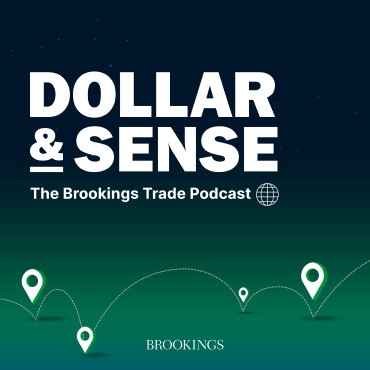
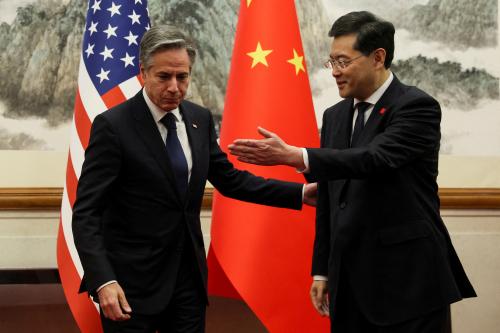
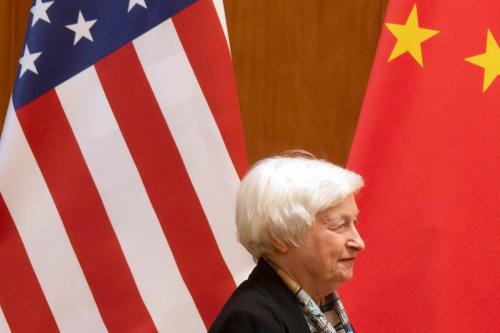
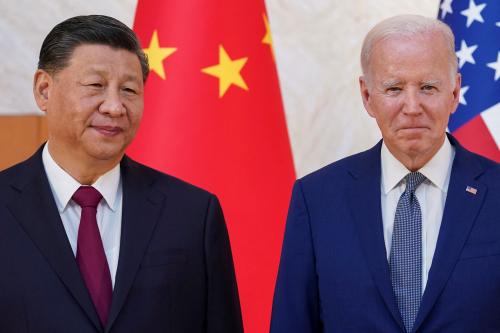




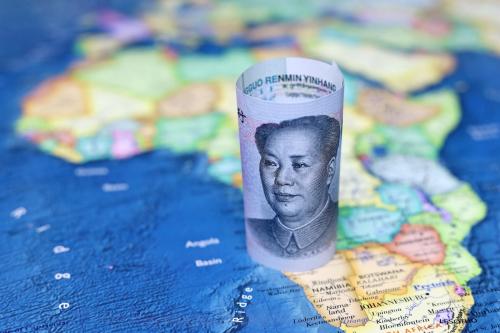
Commentary
PodcastWhat’s the best case scenario for US-China relations?
Listen on
Dollar and Sense Podcast
August 14, 2023